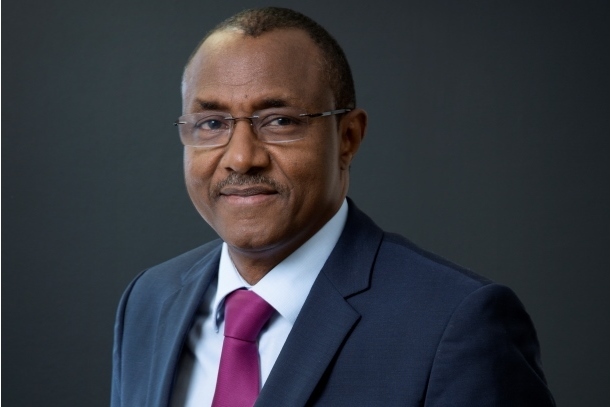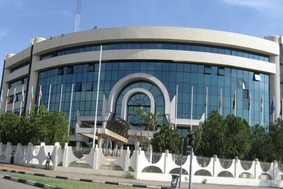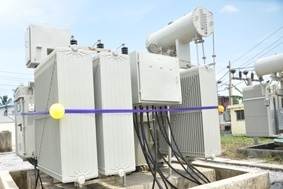Building resilience to climate risks in Africa’s agriculture

Feature Highlight
The AU in 2012 established the African Risk Capacity as an African solution for Africa.
Agriculture represents tremendous opportunities for African economies. The sector contributed more than $100 billion to Africa’s GDP in 2016. But much of that potential could be realised if there are effective solutions addressing the factors that drive the under-performance trend in the sector.
Over 60 percent of the Sub-Saharan African population practises agriculture in rural areas, producing 60 – 70 percent of food consumed. The agricultural sector contributes to 70 percent of GDP in the region. But historically, low human capital, inadequate investment, adverse weather conditions and little-effective policy support have constituted the perfect storm for the low productivity of Africa’s agriculture.
The smallholder farmers that dominate the continent’s farm assets are poor, formally uneducated and unable to access finance and markets. Whereas there have been flurries of national and regional policies aimed at boosting Africa’s agriculture, delivery on commitments have been weak, not least because of the limitations of available budgets amidst competing needs. Only a handful of countries have been able to invest 10 percent of their budgets on agricultural development as stipulated in the Maputo Declaration on Agriculture and Food Security.
The reasons to find effective solutions to Africa’s agricultural challenges are compelling. The most important reason is that the problems are solvable. The continent holds more than half the reserves of the world’s uncultivated arable land. With the world’s population on course to rise to 9 billion by 2050, Africa holds the key to global food security. This also underlines the huge foreign exchange revenue potentials of our agriculture.
In the meantime, however, Africa’s agriculture has been synonymous with poverty. Our agrarian communities are the frontiers of under-development, where transport infrastructure and electricity supply are nearly non-existent; where disease burdens are high; and where access to quality education is abysmal. To make appreciable development progress in Africa, therefore, is to lift labour providers in agriculture out of poverty and successfully transform the agriculture value-chain to sustainable businesses.
The road to sustainable progress is long. Unfortunately, there has been a growing threat to sustainable progress in Africa’s agriculture, and development, more generally. This threat is climate change. Agriculture represents the gateway for the more endemic and sustained impact of climate change in Africa. Based on the sheer number of labour employed in the continent’s subsistence farming, 700 million people are likely to be impacted.
Increases in temperature and reduction in rainfall will reduce food production and exacerbate hunger. As it is now well known with climate change, the most vulnerable people are usually the hardest hit, because of the absence of, or weak, resilience systems.
Until very recently, whenever a disaster occurs on the continent, most of the governments, due to fiscal constraints usually resort to external humanitarian assistance. Often the assistance came late despite the goodwill of the international community which over the years went shrinking. Studies have shown that successive natural disasters have led to political instability and change of government. In addition, the destruction of farmers’ livelihoods have fuelled migration and contributed to the growth of slums in major cities precipitating unprecedented migration through the Sahara and Mediterranean Sea.
Climate change-induced intensification of natural disasters has become the mother of all development challenges in Africa, specifically because of its scale and its potential of undermining efforts at solving the other issues. In Malawi, a country of 18 million population, more than 6.5 million people have become vulnerable to droughts and floods.
The recession of the Lake Chad, which has lost up to 70 percent of its historical water level, has continued to drive deprivation, fuelling conflicts in the countries that border the Lake Chad Basin: Nigeria, Chad, Niger and Cameroon. The impact of the conflicts on food security is now coming into reckoning. Pastoralists, who having been migrating from the northern part of Nigeria southward to find grazing, have allegedly been victims of cattle rustling and involved in clashes with host communities.
Climate change has been identified as a global challenge. Mitigation and adaptation mechanisms cannot be left to national or community efforts. The Paris Climate Accord would serve to confirm this. But, solutions that are closer to home are key to building resilience and marshalling rapid and effective response when climate disaster risks crystallize.
Based on shared risks and given the disparate but generally limited capacities of African countries to build resilience systems and response to extreme weather events, the African Union (AU) in 2012 established the African Risk Capacity (ARC). This Specialised Agency, essentially is an African solution for Africa.
The ARC was founded on the fundamental understanding that responding to natural disasters without prior planning is costlier and less effective. Therefore, the ARC was conceived to help Member States of the AU improve their capacities to better plan, prepare and respond to extreme weather events and natural disasters. This is with the view of helping to improve food security of Africa’s vulnerable populations.
What do we do? ARC has been developing modern finance mechanisms, such as risk pooling and risk transfer, to create pan-African climate response systems that enable African countries to meet the needs of people harmed by natural disasters. According to the ARC Establishment Agreement, the Agency is working to assist AU Member States to reduce the risk of loss and damage caused by extreme weather events and natural disasters affecting Africa’s populations by providing targeted responses to disasters in a more timely, cost-effective, objective and transparent manner.
The ARC Group comprises the Specialised Agency and its financial affiliate, ARC Insurance Limited. The Agency is responsible for general oversight, solution development, capacity building for individual countries, programmes and implementation monitoring for the group. On its part, ARC Insurance carries out the group’s commercial insurance functions of risk pooling and risk transfer in accordance with national regulations for parametric weather insurance.
With widespread climate disaster risks across Africa, ARC is providing insurance tool to help countries manage the risks and respond to disasters in a financially efficient manner. This approach lowers the cost of response to disasters and prevent them from leading to humanitarian crises. It proactively puts in place the mechanism for providing services to vulnerable populations affected by extreme weather events.
Sourcing funding for disaster response reactively is inefficient. Very often, this approach is met with budgetary constraints. Exclusive public sector funding also combines with the limitations of the bureaucracy in planning and execution. However, ARC’s contingent funds link to early warning systems, and appropriate contingency plans link with credible national response mechanisms to offer the best solutions for delivering more effective and efficient responses to weather shocks in the short term. ARC is also facilitating long-term investments in increasing food security, disaster risk reduction and climate resilience.
Participating countries pay premiums. In recognition of the immediate financial constraints to countries which badly need the risk pooling solution, ARC has been working with international donors to lower the required premium; at the same time, we are also working with partners, including the African Development Bank, on premium financing.
Support from donors and partners, including German Cooperation Bank - KFW, Global Affairs Canada, Rockefeller Foundation, Swiss Agency for Development and Cooperation, UK’s Department for International Development, Sweden, French Development Agency, IFAD and WFP, have been instrumental to the work we have been able to accomplish in the five years of ARC. To date eight countries have participated in the 4 drought risk pools launched by ARC Ltd. They are Burkina Faso, Niger, Senegal, Gambia, Mali, Mauritania, Malawi and Kenya. We expect that our partnership with AfDB for the Africa Disaster Risk Financing (ADRiFi) will fully effectuate our ongoing plan for a Premium Financing Facility to enable us to cover more African countries.
We have just taken the first few steps in the journey to making Africa’s agriculture and vulnerable people resilient to climate disasters risks, focusing initially on our drought model. As at the end of 2017, ARC has served 2.1 million people, and 900,000 livestock in four African countries when their harvests failed and paid out over $36million thereby demonstrating the proof of its concept.
African governments have now pooled $54 million together from their own limited resources to spearhead this African innovation, while 33 Member States and the African Union have continued to steer the ARC team to build the best climate solutions for Africa. We are working to expand our solutions, beneficiaries, impacts and stakeholders.
Mohamed Beavogui is Director General, African Risk Capacity; and United Nations Assistant Secretary General.
Other Features
-
At 50, Olajide Olutuyi vows to intensify focus on social impact
Like Canadian Frank Stronach utilised his Canadian nationality to leverage opportunities in his home country of ...
-
Reflection on ECOWAS Parliament, expectations for the 6th Legislature
The 6th ECOWAS Legislature must sustain the initiated dialogue and sensitisation effort for the Direct Universal ...
-
The $3bn private credit opportunity in Africa
In 2021/2022, domestic credit to the private sector as a percentage of GDP stood at less than 36% in sub-Saharan ...
-
Tinubunomics: Is the tail wagging the dog?
Why long-term vision should drive policy actions in the short term to achieve a sustainable Nigerian economic ...
-
Living in fear and want
Nigerians are being battered by security and economic headwinds. What can be done about it?
-
Analysis of the key provisions of the NERC Multi-Year Tariff Order ...
With the MYTO 2024, we can infer that the Nigerian Electricity Supply Industry is at a turning point with the ...
-
Volcanic explosion of an uncommon agenda for development
Olisa Agbakoba advises the 10th National Assembly on how it can deliver on a transformative legislative agenda for ...
-
Nigeria and the world in 2024
Will it get better or worse for the world that has settled for crises?
-
The Movers and Shakers of Nigeria 2023
This special publication profiles 25 people and institutions based on their societal or industry impact in 2023.
Most Popular News
- IFC, partners back Indorama in Nigeria with $1.25 billion for fertiliser export
- Ali Pate to deliver keynote speech at NDFF 2024 Conference
- Univercells signs MoU with FG on biopharmaceutical development in Nigeria
- CBN increases capital requirements of banks, gives 24 months for compliance
- CBN settles backlog of foreign exchange obligations
- Nasdaq Dubai welcomes $600m sukuk listing by Islamic Development Bank












